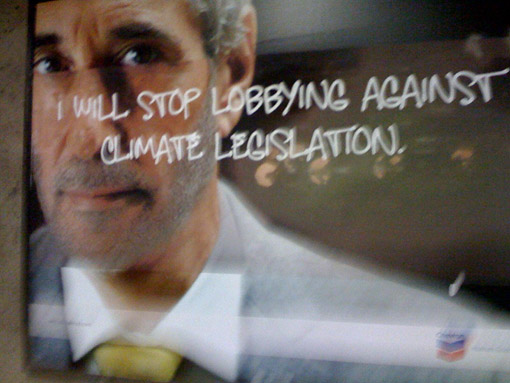eco: Earth Hour vs. a 2000-watt society
There's a predictable backlash to this weekend's Earth Hour, the third (or fourth?) iteration. I support the gesture and the criticism of it — we turned off our lights for half of this one, because we forgot. I posted this comment in response to one blog's "Fcuk Earth Hour:"
Earth Hour is fine, but the COMPLETE ABSENCE OF A REAL F***ING GOAL LINE from all discussions is pretty depressing.
Q: “I still have no idea what I personally should do.”
A: Reduce your share of greenhouse gas emissions to a sustainable level. Cue Chevron's revolting greenwash ads with a concerned Jeremy Irons lookalike intoning "I will use less energy". But how much less energy?!? With 7 billion people on earth, some engineers in Switzerland estimated that a sustainable personal share of greenhouse gas emissions works out to average power use of 2 kilowatts. In other words, all your energy use (not only electrical) should come to no more than 17,520 kilowatt-hours per year. Read Wikipedia's "2000-watt society" article, which references Elizabeth Kolbert's excellent "The Island in the Wind" article in The New Yorker where I first heard of it.
2000 watts seems doable if you just look at your monthly electricity bill — you're way out of line if you use 1400 kW·h a month of electricity — but it's staggeringly low if you factor in heating, transportation, and your share of society's energy consumption. I think it's 60 million Btus a year, only 478 gallons of gasoline! Ride a bike, go hardcore on energy conservation, don't heat or cool your house, only fly every few years, consume dramatically less manufactured goods. And/or spend a lot on renewable energy generation.
It's a daunting challenge, so all the feel-good stuff doesn't mention it, so people sincerely believe that by replacing a few lightbulbs and recycling some paper they'll save the planet. Every little bit helps, but those are tiny little bits.
Just because it's difficult, the reactionary "I can't/won't live that way, therefore I won't try at all and will be venemous and hateful towards enviro wackos" is far more moronic than not participating in whatever Earth Hour is going on.
 (hacked billboard in DC, from Bioephemera blog
(hacked billboard in DC, from Bioephemera blog
Earth Hour is fine, but the COMPLETE ABSENCE OF A REAL F***ING GOAL LINE from all discussions is pretty depressing.
Q: “I still have no idea what I personally should do.”
A: Reduce your share of greenhouse gas emissions to a sustainable level. Cue Chevron's revolting greenwash ads with a concerned Jeremy Irons lookalike intoning "I will use less energy". But how much less energy?!? With 7 billion people on earth, some engineers in Switzerland estimated that a sustainable personal share of greenhouse gas emissions works out to average power use of 2 kilowatts. In other words, all your energy use (not only electrical) should come to no more than 17,520 kilowatt-hours per year. Read Wikipedia's "2000-watt society" article, which references Elizabeth Kolbert's excellent "The Island in the Wind" article in The New Yorker where I first heard of it.
2000 watts seems doable if you just look at your monthly electricity bill — you're way out of line if you use 1400 kW·h a month of electricity — but it's staggeringly low if you factor in heating, transportation, and your share of society's energy consumption. I think it's 60 million Btus a year, only 478 gallons of gasoline! Ride a bike, go hardcore on energy conservation, don't heat or cool your house, only fly every few years, consume dramatically less manufactured goods. And/or spend a lot on renewable energy generation.
It's a daunting challenge, so all the feel-good stuff doesn't mention it, so people sincerely believe that by replacing a few lightbulbs and recycling some paper they'll save the planet. Every little bit helps, but those are tiny little bits.
Just because it's difficult, the reactionary "I can't/won't live that way, therefore I won't try at all and will be venemous and hateful towards enviro wackos" is far more moronic than not participating in whatever Earth Hour is going on.
 (hacked billboard in DC, from Bioephemera blog
(hacked billboard in DC, from Bioephemera blogLabels: eco

